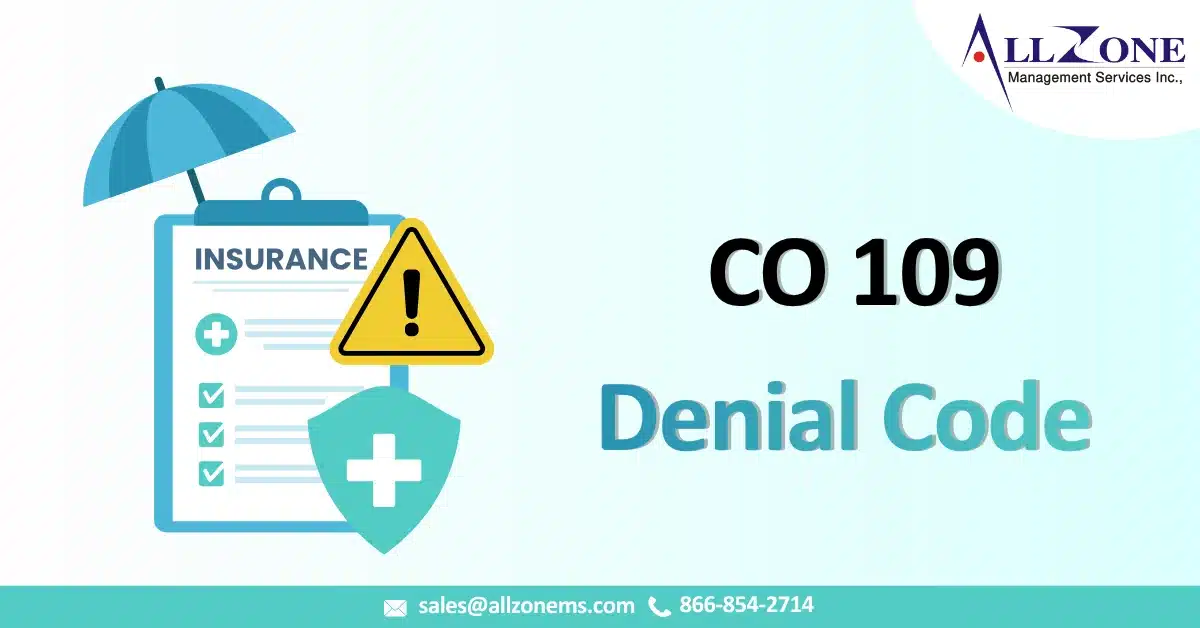In the complex world of medical billing, claim denials can significantly impact a provider’s cash flow, operational efficiency, and financial stability. One of the most common and often misunderstood denial codes is CO 109. This denial typically arises due to timely filing issues, which means the payer received the claim after the allowed submission deadline. To avoid such financial setbacks, healthcare providers must clearly understand the key causes, the impact on reimbursement, preventive strategies, and filing deadlines across different payers.
In this detailed guide, we’ll break down everything you need to know about CO 109 denial code, filing limits, and how expert billing support from Allzone Management Services can help your practice stay compliant and profitable.
What Is CO 109 Denial Code?
CO 109 – “Claim/service not covered by this payer/contractor. You must send the claim/service to the correct payer/contractor.”
However, in most payer-specific adjudication processes, especially Medicare and commercial insurance plans, CO 109 is frequently used to indicate that a claim was denied due to “timely filing” issues, meaning the claim was not submitted within the payer’s filing limit.
In short, CO 109 = Late submission or incorrect payer submission.
Filing Limit for Claim Submission: Key Payer Deadlines
Each insurance company has a specific time window for claim submission:
| Payer | Filing Limit |
| Medicare | 12 months from the date of service |
| Medicaid (varies by state) | 90–180 days |
| Blue Cross Blue Shield | 90–180 days (plan-specific) |
| Commercial Insurances | 90–120 days |
| Tricare | 1 year |
| Workers’ Compensation | Varies based on state laws |
| Medicare Advantage Plans | 90–180 days |
Missing these deadlines can result in irreversible revenue loss unless an appeal is supported with valid documentation.
Common Causes of CO 109 Denial Code
Understanding the root causes behind CO 109 can significantly reduce your denial rates. Here are the most frequent reasons:
- Claims not submitted within the payer’s allowed filing time
- Incorrect payer selected during claim submission
- Ineffective claim tracking and follow-up process
- Provider credentialing or enrollment delays
- Claim resubmissions delayed after rejections
- Poor documentation of proof of timely filing
- Inaccurate or outdated patient insurance details
- Internal inefficiencies or staff shortages in billing
Impact of CO 109 Denials on Healthcare Providers
Ignoring or mishandling timely filing denials can result in serious financial consequences:
- Revenue Loss: Most CO 109 denials are non-recoverable if not appealed within timelines.
- Increased Accounts Receivable (AR): Delays push claims into aging buckets.
- Administrative Burden: Time-consuming rework drains billing teams.
- Cash Flow Disruptions: Revenue cycle continuity gets affected.
- Compliance Risks: Failure to meet filing deadlines may trigger audits.
- Lower Provider Profitability: Impacted margins affect operational stability.
Best Practices to Avoid CO 109 Denial Code
To eliminate CO 109 denials, medical practices must adopt a proactive and structured denial prevention strategy. Here are the top best practices:
- Establish a Standard Timely Filing Policy: Maintain a reference chart for filing limits by payer and ensure your team adheres to strict timelines.
- Verify Insurance Details during Patient Registration: Always confirm the payer, policy validity, and coverage status to avoid incorrect submission.
- Utilize Real-Time Claim Tracking Tools: Automated RCM systems help track pending claims before deadlines.
- Maintain Proof of Timely Filing: Always keep electronic submission reports, acknowledgment receipts, EDI confirmation logs, etc.
- Appeal with Supporting Documentation: Some payers allow reconsideration if valid proof exists.
- Outsource Billing to Experts Like Allzone: A professional billing partner ensures timely submissions and high first-pass resolution rates.
Preventing Timely Filing Rejections: Strategic Approaches
Here’s how healthcare practices can put a stop to filing-related denials:
- Automate reminders for filing limits
- Schedule daily/weekly claim reviews
- Prioritize rejections for resubmission
- Implement KPI monitoring for filing metrics
- Leverage denial analytics to address recurring issues
- Assign dedicated teams for payer-specific claims
Tip: Claims nearing filing deadlines must be fast-tracked with high priority.
What to Do If You Receive a CO 109 Denial?
- Verify if the denial was correctly assigned
- Check payer’s timely filing rules
- Review EOB/ERA for submission timelines
- Gather proof of initial claim submission
- File an appeal with supporting documentation
- If past deadline with no valid proof, write it off as provider responsibility (PR) or contractual obligation
How Allzone Helps Prevent CO 109 Denials
At Allzone Management Services, our expert medical billing team ensures seamless claim submissions and zero revenue leakage due to preventable denials such as CO 109. We provide:
- 24/7 claim monitoring and tracking
- Automated filing deadline alerts
- Real-time denial analytics reporting
- Insurance verification and eligibility checks
- Rigorous documentation and audit support
- Fast appeal filing and resubmission handling
- 98% first-pass claim acceptance rate
With a strategic approach, intelligent automation, and expert coders & billers, Allzone eliminates filing-related denials and accelerates reimbursement.
Final Thoughts
The CO 109 denial code is a leading cause of lost revenue for healthcare providers, especially when filing deadlines are overlooked. Understanding payer rules, tracking claim timelines, and adopting denial prevention best practices are essential. With an experienced billing partner like Allzone medical billing company, providers can eliminate timely filing rejections, boost reimbursements, and ensure a seamless revenue cycle.

